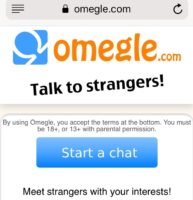It’s a parent’s job to protect their kids, but sometimes that can feel impossible in a digital age. And although apps themselves do not pose an actual threat to their safety, they can provide an opportunity to expose, persuade, and, potentially lead kids to make bad decisions. So how do we stay informed about the countless apps kids use to be sure they’re safe? Thankfully, the same digital age that makes us fearful for our children, provides plenty of resources and information for parents, too!
First, be as proactive as possible. Talk to your children about cell phone safety, and explain that, despite what some apps may profess, there really is no such thing as texts or photos that disappear completely. Second, if possible, add your kids to your iCloud account. That way, whenever they download an app, it will automatically download to your phone as well. Similarly, with a Playstore account, you’re able to see all “purchased” (i.e., downloaded) apps. They may think you’re invading their privacy, but you’ll have more input into which apps they’re using.
In addition to those tips, stay informed about any apps that may be of concern. We’ve listed here several apps that are popular with kids but may pose some issues for parents.
1. HIP
You know the old saying “don’t judge a book by its cover?” Well, that is the case for Hide it Pro (HIP), an app disguised as a music manager, but really it’s meant for hiding anything from photos and videos to text messages and other apps. The name is pretty straightforward in the app store, but on your screen it simplifies to HIP to add to the clever mask. The user sets a pin code and can then move files to the app and remove them from the phone (i.e., photos, messages, etc.). This, and similar hidden “vault” apps, helps kids hide inappropriate material from their parents.
2. Calculator+
Same concept, but this app has a calculator icon posing as something it isn’t. The calculator actually acts as the password input (PASSCODE followed by %), which reveals hidden photos, contacts, browser history, and passwords. Again, the name ‘secret calculator’ is straightforward in the app store, but the app appears as calculator+ once it’s downloaded to the user’s phone, to help minimize suspicion and hide the purpose from concerned parents.
Other apps that allow users to hide content include: KeepSafe, HPS, SA, and more.
3. Snapchat
If you have a teen or tween in your home, then it’s likely you’ve heard of Snapchat, an app that allows you to send a photo or video from your phone and determine how long the person on the other end can see the image until it “disappears.” The caveat is that it will not disappear forever because recipients have the ability to take screenshots of whatever photo or video messages they receive. Although senders get a notification that a screenshot was taken, it doesn’t stop the ramifications that may result.
Snapchat has a “Snapchat Safety Center” publication reminding kids that nude pictures are not allowed. “Don’t use Snapchat for any illegal shenanigans and if you’re under 18 or are Snapping with someone who might be: Keep your clothes on!” the company wrote.
Other popular social media apps that allow private messaging include: Facebook, Twitter, Instagram, Tumblr, Tik Tok (musical.ly), and more.
4. Line 
Line is another all-in-one mobile hub for chatting, sharing photos and videos, and free texting and video calls. Users decide how long their messages will be visible (two seconds or a week). They also can be charged for in-app activities, but that would only be an issue if your child has access to a credit card.
5. Omegle

Other chat room sites and live streaming apps that connect strangers include:
6. Tinder
Tinder is a popular app that allows users to “rate” profiles and locate people via GPS track ing. That means if you turn on the “10 mile radius,” your search results will filter people within that range, making it far too easy for adults and minors to find one another. Like many other apps, it states that you must be “18 years of age or older to create an account,” but there is no verification. Similarly, there is an app, Yubo, that has been called the “Tinder for teens” because users are able to swipe left or right on profiles to accept or reject each other. Once a connection is made, they can chat and hook up via Snapchat or Instagram.
7. Whisper
Whisper is an online community app that allows users to anonymously share what they’re really thinking. The word anonymous seems to be open to interpretation though because although the app claims it does not store personally identifiable information, if you disable the geo-location, other users are still able to determine your city, state, and country. There is also a “nearby” section where you can see posts from people who are in the same area. Users may be exposed to cyber-bullying, explicit language, references to drugs and alcohol, and other material that would concern parents. Because the app provides geo identifying information, there is increased danger that strangers will see where your child is currently located. The app also promotes private communication where users can exchange images and personal information. It’s absolutely not an app I would want my child to use.
Other anonymous social network applications include: Yik Yak Generator, After School, Anomo, Psst! Anonymous, and more.
8. Kik Messenger 
Kik is a messaging app that lets users exchange videos, photos, sketches, and gifs. Privacy is a big concern, however, as users can send and receive messages from people they are not friends with. Kik does not offer any parental controls, and can be password protected, allowing users to prevent parents and others from seeing their activity in the app. Again, there is no way of authenticating users, thus making it easy for predators to use the app to interact with minors.














































